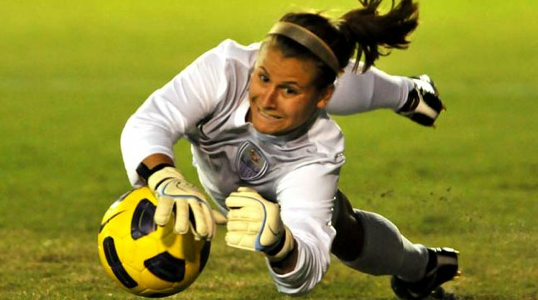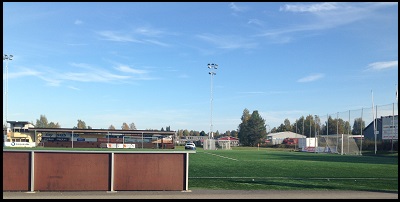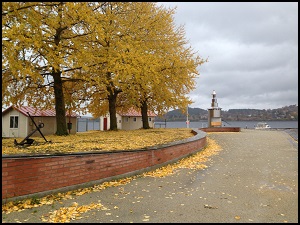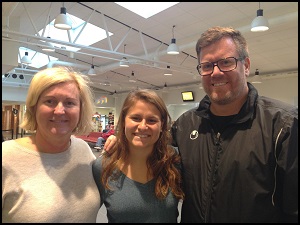Ping’s Professional Experience
If you have read any of our Dynasty blogs before there is a good chance you have read about former Dynasty student and current staff coach Megan Kinneman, aka “Ping”, during her college career at Louisiana State University. And a few of you lucky Dynasty goalkeepers out there have had the privilege of being coached by her at our summer and winter camps! She is extremely technical, fiercely competitive, hard working, and a TON of fun. Since graduating from LSU in December of 2013 Megan has continued her playing career and is fighting hard to make the jump into the professional ranks. It isn’t any easy transition for a goalkeeper, when there are limited slots available, but if there is a way Ping will work her tail off until she gets there! I guarantee! the following is her blog post about her past year playing in the NWSL and abroad.
MY NWSL EXPERIENCE
 After graduating from LSU in December of 2013, I tried out for the NWSL’s Houston Dash and Washington Spirit. I was offered a spot in both club’s preseason camps, but chose to stick around in my hometown of Houston. After going through preseason with the Dash, I became the third goalkeeper behind Erin McLeod and Bianca Henninger. As a reserve player, I trained with the team all season and dressed for one regular season game and one scrimmage.
After graduating from LSU in December of 2013, I tried out for the NWSL’s Houston Dash and Washington Spirit. I was offered a spot in both club’s preseason camps, but chose to stick around in my hometown of Houston. After going through preseason with the Dash, I became the third goalkeeper behind Erin McLeod and Bianca Henninger. As a reserve player, I trained with the team all season and dressed for one regular season game and one scrimmage.
Coming from LSU and the SEC, there were definitely some adjustments to the pro level. In college, I was used to the athletic and competitive play of the SEC. At the professional level, play is still athletic, but the pace is significantly faster and players are all incredibly technical. Not only do they have a good touch, they have the awareness to use that first touch to solve pressure, hence the speed of play is even faster! This awareness is also apparent when it comes to finishing. I quickly learned that if I were off of my ball line in the slightest, I would be punished for it.
 One of my best assets as a goalkeeper is how solid and technical I am. It is a strength of mine that has allowed me to excel at the collegiate level and now beyond despite my height, which many coaches view as a physical limitation. With the Dash, I felt that my technique served me well and I was able to hold my own. Two areas that I found I need to adapt at this level were my catching and kicking. I have always held myself to a high standard when it comes to catching, but with shots coming in at a harder pace bending, dipping, and swerving more, I had to choose more wisely when to catch versus when to push them away. In addition I have always considered myself to be confident with the ball at my feet, but training with the Dash showed that there was still work to do. Players rely on goalkeepers as an outlet more often. This means in competitive small-sided games, playing one touch accurately with both feet is a necessity.
One of my best assets as a goalkeeper is how solid and technical I am. It is a strength of mine that has allowed me to excel at the collegiate level and now beyond despite my height, which many coaches view as a physical limitation. With the Dash, I felt that my technique served me well and I was able to hold my own. Two areas that I found I need to adapt at this level were my catching and kicking. I have always held myself to a high standard when it comes to catching, but with shots coming in at a harder pace bending, dipping, and swerving more, I had to choose more wisely when to catch versus when to push them away. In addition I have always considered myself to be confident with the ball at my feet, but training with the Dash showed that there was still work to do. Players rely on goalkeepers as an outlet more often. This means in competitive small-sided games, playing one touch accurately with both feet is a necessity.
The NWSL season packs a lot of games into a short amount of time consisting of a weekend game sometimes followed by a midweek game. This often meant fewer or lighter practices as well as reduced lifting of only once a week. For the core of the team, this schedule made sense in order to recover by the next game. However, as a reserve, days off and lifting once a week wasn’t enough to maintain my strength and conditioning so I reached out to our strength coach and got on a workout plan for when the team traveled. One of the biggest lessons I took away from my first season was that at the professional level, you must take more responsibility for yourself and your physical preparation. No one will be watching over you to make sure you get it done. There is no one there to drag the effort out of you. It is on you to WANT to be your best. And if you don’t get it done there is always someone else pushing to take your spot.
I had a firm grasp of my role as the third goalkeeper when I joined the Dash; train hard every day, be prepared if needed, challenge the goalkeepers around me, and be sure they are getting the training/serves they need to be prepared for games. One of the challenges I faced as the season went on, was to stay mentally focused and motivated every day without the vision of playing time. In addition, similar to being a freshman in college, being a rookie in the pros requires you to become confident and comfortable organizing older, more experienced players. This was one of my bigger struggles. Typically, I am very confident in my communication, but it took me longer with the Dash. I believe part of it was the fact that I was commanding players up to ten years older than me some of whom had possibly played in World Cups and Olympics! It was a bit daunting at first. The other part was that I was no longer the starting goalkeeper like I was at LSU. I knew that communication was a necessity at this level and I had nothing to be nervous about, but for some reason information just didn’t come out as naturally. Ultimately, my teammates wanted to hear me communicate. They needed information from my view in order to be successful and I knew this; it just took me longer to gain the confidence.
I am incredibly grateful for the opportunity to train with the Dash because it showed me a higher level of play and training on the field than I had previously experienced. Facing more challenging, intelligent attackers took me out of my comfort zone and pushed me to improve. It taught me to make small goals on a daily basis to continue to improve, to be confident in my abilities, to not be afraid to ask questions, and that consistent hard work and professionalism earn the respect of your peers.
Overall, I believe that I benefitted the most from the quality group of Dash goalkeepers. I have never trained on a consistent basis with such a talented group of goalkeepers and incredible human beings. The high level of focus and drive to improve small details motivated and pushed me to train even further on the edge. I learned to always find a balance of training on your edge and not taking yourself too seriously. This way when you have a bad training session, you are able to learn from it, maybe make a joke about it, forget it and move on to the next session.
SOCCER IN SWEDEN
Following a wonderful experience training with the Houston Dash in the NWSL, I turned my sights in August to finding a team overseas to gain game experience. As a successful Division 1, SEC goalkeeper who now had some pro training experience under my belt, I thought I would have a chance of finding a team to play for. Unfortunately, I struggled to find a team in need of a goalkeeper in what was the midpoint of many leagues overseas. If you are a good goal scorer or versatile field player, it is much easier to find a team because you have ten spots on the field and a few on the bench. However, as a goalkeeper, there are two, maybe three spots on each team and the second one is often a local or younger player that they are looking to improve. I have to be honest, some days during this crazy waiting game I considered going back to my days as a midfielder!
Frustrated and without any opportunity to play abroad, I remembered a meeting I had over coffee my senior season at LSU. One of my friends had played in Sweden and happened to have two Swedish friends visit him in Baton Rouge. He knew I wanted to play overseas after my senior season so he invited me to meet them. One of them, Stefan, is the goalkeeper coach for Sunnanå, a second division (Elitettan) Swedish team. He told me that any time I wanted to go to Sweden to let him know. After just one coffee meeting a year prior and a Skype conversation, he offered me three weeks of training with his team. While this was not game experience, I would be able to get good training and exposure, while also learning about a new culture! DONE DEAL! Flight to Skellefteå, Sweden booked!
I stayed with Stefan and his incredible family in Skellefteå.
Luckily for me, most people in Sweden speak English, although I did have to get used to players and coaches speaking just Swedish on the field. In addition to team training I was also able to jump in on some goalkeeper specific training with some local men! Stefan also coaches the goalkeepers for a men’s team in the area, so on Tuesday nights the men’s and women’s goalkeepers all train together. This was a great environment for getting harder shots and more challenging attackers on crosses! Two of the guys were shorter like me, but used their footwork and positioning to make up for it. Their ability to catch a cross and casually side volley a perfectly driven ball to a target on the opposite side was unreal. They were great to train with so I could watch and learn from how they found a way to be successful as smaller male goalkeepers. One week I was fortunate to be able to jump in on a crossing and finishing drill with the men’s team. On shots in the control zone, I was pleased that I was able to catch and hold, even with the increased pace. On shots that required me to dive, it was more difficult to hold (if I could get to them at all) because of the nasty bend they put on their shots with all the pace too! Overall, I did well to keep up with the guys and even got a few compliments in English for my efforts.
While in Skellefteå, Stefan arranged a day trip for me up to Piteå to train with a team in the top league and a little spare time to explore a new city! I took an hour bus ride north to catch a technical and shooting practice in the morning and a competitive small-sided session at night. Both sessions were a blast for me and despite only training for one day the team made me feel welcome. Just as my three weeks in Skellefteå were ending I was lucky that another opportunity arose with a team in Östersund. There I trained for a week with a team that was preparing for a home and away playoff in hopes of moving up to the second division.
If I compare all of the teams there was a common trend of indirect, technical build up in the attack. The Swedish style was not as fast paced and direct as what I experienced in the NWSL, nor did they rely solely upon their athleticism to generate attacks. On defense Swedish teams tended to play a lower line of confrontation and force their opponents to break them down. As a goalkeeper in this system this meant you had more time on the ball to distribute because the opponent dropped off so quickly and because your team wanted to build from the back more. I had to adjust how I restarted play and controlled the tempo of the game. At times I needed to make distribution decisions faster before the opponent settled back. I needed to recognize when to play quickly in order to get the opposition to shift and find gaps for our team to possess out of our end, yet still recognize the moments when it was best to slow it down and build through our center backs.
When it comes to the goalkeeping specific training, the training I experienced was less agility/cone footwork than I have seen in the US. Instead often times playing with your feet was incorporated into a shot stopping drill. For instance you might deal with a one touch back pass from one side, then get across and set at a new angle for a shot. Friday sessions with Sunnanå were probably my favorites. We always started with a good 20-30 minutes of 5v2 with varying rules to challenge you in new ways and keep it interesting. Then we moved on to the greatest possession game invented, which you may know by a different name, but I know it as “Over the River.” Ultimately, it is a day focused primarily on small-sided possession (no wonder they are so technical!) where I was able to enjoy improving my feet. More importantly though I realized how awesome it is that certain games from my practices in the US were the same in Sweden. We speak a global language on the field! Despite the girls speaking Swedish around me, I still understood why everyone was laughing and smiling when there was a nutmeg or split in 5v2. It was cool to witness first hand how soccer can bring people together.
Training abroad provided me with a rare opportunity to get feedback from many different coaches and players. The attributes that coaches stressed to me as my strengths that they were impressed with were my strong technical foundation, quickness, good vision, and presence. In addition to continuing to hone my strengths I was also given some helpful advice on areas that could improve and elevate my game. Extending my arms longer, with less bend in my elbows, was recommended to get every bit of extra height and full reach out of my body. The other area is becoming more consistent with my distribution decisions when building out of the back. Sometimes I am overly ambitious and try to play the killer perfect ball (which usually means high risk) out of the back instead of the simple short pass to get the opposition to shift.
Overall, I had an incredible journey learning from varying skill levels of players on the field while getting to know some incredible people off the field. I remembered that I play soccer to enjoy it, that it offers so many more lessons than winning and losing, and that it allows many incredible opportunities beyond the game. As for my playing career, it is still a very big question mark and waiting game. I went to Sweden and worked hard to showcase my abilities. Whether it pays off now, or further down the road, is out of my control, so now all I can do is prepare for when the opportunity comes.
SWEDEN IN GENERAL
The time I spent in Sweden was unique because I was able to actually experience the culture as a Swedish citizen versus visiting as a tourist. I loved the small towns and the ability to walk or bike everywhere. Coming from the massive city of Houston, I can barely bike around my neighborhood, let alone think about getting to practice downtown. I would love to have more sidewalks and bike lanes to get around locally instead of driving. As I previously mentioned, most people speak English which made my life easy when getting around town or picking up a coffee at the local café. I was lucky enough to have Stefan’s family or teammates to hang out with, but overall I felt that people were very friendly and welcoming. The small towns create a simple life revolving around friends, family and work. During the three weeks I was in Skellefteå, I was able to watch at least six professional games in person! I love that going out to watch a local soccer game is a social outing in Sweden! I would happily go back to Sweden if given the opportunity. However, that being said I was eager to return home to cheaper prices (Sweden is one of the more expensive countries in the world), easy contact with my family and friends, and, of course, Chipotle!






Comments are closed.